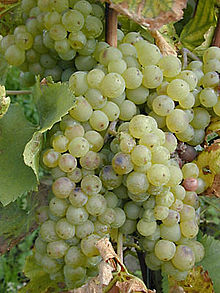Chasselas
| Chasselas | |
|---|---|
| Grape (Vitis) | |
 Chasselas grapes growing in Baden under its local name Gutedel | |
| Color of berry skin | Blanc |
| Species | Vitis vinifera |
| Also called | Chasselas blanc, Fendant, Gutedel, and other synonyms |
| Notable regions | Switzerland, Baden (Germany), Loire (France) |
| VIVC number | 2473 |

Chasselas or Chasselas blanc is a wine grape variety grown in Switzerland, France, Germany, Portugal, Hungary, Romania, New Zealand and Chile. Chasselas is mostly vinified to be a full, dry and fruity white wine. It is also suitable as a table grape, grown widely for this purpose in Turkey and Hungary.
History
Genetic analyses made in 2009 in a laboratory of the University of Dieppe showed that Chasselas is a grape variety originating in western Switzerland.[1] Its name was first mentioned in the 16th century.
In 1940, Chasselas was crossed with Silvaner to produce the white grape variety Nobling.[2]
Wine regions
Chasselas is widely grown in Switzerland, where it has several regional synonym names, the main one being Fendant in the canton of Valais. It is considered an ideal pairing for raclette or fondue. Chasselas is also known as Perlan in the Mandement district of Geneva. In 2009, it was Switzerland's second-most planted grape variety at 4,013 hectares (9,920 acres).[3]
In Germany, with 1,123 hectares (2,770 acres), it is almost exclusively grown in the wine region of Baden under the name Gutedel.[4]
In France it is mostly grown in the Loire region, where it is blended with Sauvignon blanc to produce a wine called "Pouilly-sur-Loire". Californian and Australian growers know this variety under the names Chasselas Doré and Golden Chasselas.
Michel Chapoutier has stated that he is looking for land for a vineyard in England, which would be planted with Chasselas. He said that he believed Chasselas would suit the English climate and terroir very well.[5]
References
- ^ J. F. VOUILLAMOZ et C. ARNOLD Etude historico-génétique de l’origine du ‘Chasselas’ (PDF), Université de Neuchâtel, NCCR Plant Survival, 2009
- ^ J. Robinson Jancis Robinson's Guide to Wine Grapes pg 129 Oxford University Press 1996 ISBN 0198600984
- ^ Office fédéral de l’agriculture OFAG: Das Weinjahr 2009 / L'année d'viticole 2009 Archived 2011-07-07 at the Wayback Machine
- ^ German Wine Institute: German Wine Statistics 2007-2008 Archived September 20, 2008, at the Wayback Machine
- ^ Adam Lechmere, "Chapoutier looks for English vineland", Decanter.com News, Thursday 12 May 2011
